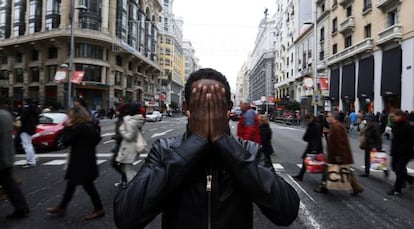“The police have arrested me 160 times just because of my appearance”
Cameroonian resident of Spain is a victim of a regulation that allows police to stop any citizen on the street

Yafar is a 29-year-old man from Cameroon who claims to have been arrested 160 times by Spanish police since he arrived in the country in 2005.
He walked across two African deserts — his feet bear the calluses that reflect the three-year, several-thousand-kilometer journey — before he was able to reach Melilla and successfully jump the barrier that separates the Spanish exclave from Morocco.
In February 2005, he settled in the Madrid neighborhood of Parla, where his painful odyssey of systematic arrests was to begin. Because he was constantly followed by police, Yafar decided to leave the place he shared with other migrants and moved to another neighborhood. But the police continued to track him down.
Yafar laughs when he is asked how many times he was detained. "Wow, I stopped counting already, but I estimate about 160 times. In one month, they took me to police headquarters around 17 times, and there have been days where they arrested me in the morning and then again in the evening — all because of my face."
Just as soon as he arrived, Yafar obtained his residency document, but when he went to renew it for the first time officials refused to authorize it because he had a minor conviction for driving without a license. "I have a driver's license from Cameroon but no Spanish permit. Even though I paid the fine and complied with my sentence, they still refused to give me my papers because of the conviction."
Researchers found that the color of a person's skin greatly influences how authorities determine who to stop on the streets
Just two months ago, a Madrid judge sided with Yafar and ordered the Interior Ministry to renew his working permit.
But the police harassment continued, he said, especially because his residency permit had expired during his legal battle. "Sometimes they would take me in and they would say, 'You here again?' I would tell them but it is not me who keeps coming here," said Yafar, who speaks Spanish fluently.
The Cameroonian has fallen victim to the so-called Corcuera law, an internal regulation that allows police to stop any citizen on the street. It is named after former Socialist Minister José Corcuera, who designed it.
Critics claim that the police use it to target mainly migrants; Yafar has dark skin with sub-Saharan features. According to a joint study performed by the University of Valencia and Oxford University on police identifications in Spain, researchers found that the color of a person's skin greatly influences how authorities determine who to stop on the streets.
An Interior Ministry spokesman denied that arbitrary arrests of migrants are being made.
José María Benito, of the Unified Police Union, said that under the previous Socialist government police were instructed to check the IDs of "Spaniards and migrants" at the entrance of busy Metro stations. But he said that this practice has been reduced.
"Because they were considered formal detentions, it allowed the politician in office to state publicly that the police were doing a good job and that the number of arrests had increased," Benito said.
Estebán Ibarra, head of the Movement against Intolerance, also agrees that the number of ID checks has dropped but adds that police continue to use racial profiling, especially in the Lavapiés neighborhood, where many immigrants live.
Tu suscripción se está usando en otro dispositivo
¿Quieres añadir otro usuario a tu suscripción?
Si continúas leyendo en este dispositivo, no se podrá leer en el otro.
FlechaTu suscripción se está usando en otro dispositivo y solo puedes acceder a EL PAÍS desde un dispositivo a la vez.
Si quieres compartir tu cuenta, cambia tu suscripción a la modalidad Premium, así podrás añadir otro usuario. Cada uno accederá con su propia cuenta de email, lo que os permitirá personalizar vuestra experiencia en EL PAÍS.
¿Tienes una suscripción de empresa? Accede aquí para contratar más cuentas.
En el caso de no saber quién está usando tu cuenta, te recomendamos cambiar tu contraseña aquí.
Si decides continuar compartiendo tu cuenta, este mensaje se mostrará en tu dispositivo y en el de la otra persona que está usando tu cuenta de forma indefinida, afectando a tu experiencia de lectura. Puedes consultar aquí los términos y condiciones de la suscripción digital.








































